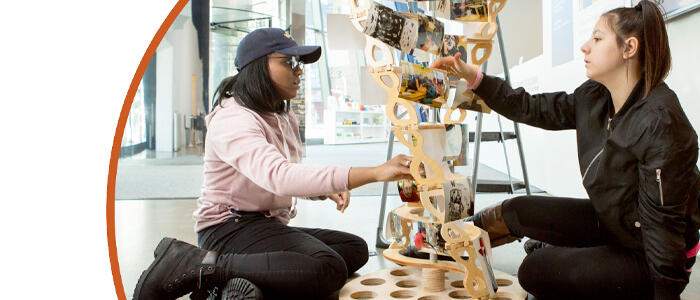Partner Hubs and Institutes
Partner Hubs and Institutes
The ECR Hub advances shared goals with other ECR-funded hubs and institutes that focus on specific methods and practices, as well as with the resource centers for other NSF programs.

ECR Data Resource Hubs and BCSER Institutes
The ECR Hub advances shared goals regarding community building and resource sharing with two ECR Data Resource Hubs that launched in 2019:
- PEERS Data Hub: The Partnership for Expanding Education Research in STEM (PEERS) data hub promotes discovery and use of wide-ranging data resources, fosters connections among STEM education researchers, and promotes learning about data analysis and data stewardship. The American Educational Research Association (AERA) and the Inter-university Consortium for Political and Social Research (ICPSR) lead this hub.
- OSF STEM Education Hub: The Open Science Framework (OSF) STEM Education Hub facilitates open and reproducible research practices in STEM education research through training materials, infrastructure, community engagement, and other resources. Activities and resources are designed to span the range of experimental, observational, longitudinal, and qualitative methods used in STEM education research.
Beyond the Data Resource Hubs, the ECR-funded BCSER Institutes for Methods and Practices provide participants with training and support in cutting-edge methodological techniques and/or research practices relevant to STEM education research:
- Advanced Quantitative and Computational Methods for STEM Education Research
- Building Capacity for Equitable Research on STEM Learning Processes using Quantitative Ethnography
- Improving Evaluations of R&D in STEM Education
- Institute for Measurement Methods in Rural STEM Education
- Institute for Meta-Synthesis: A Practicum through the Lens of STEM Equity and Inclusion Literature
- Institute in Critical Quantitative, Computational, and Mixed Methods Training For Underrepresented Scholars
- Institute on Equity-Oriented Mixture Modeling for Discipline-Based Education Research Scholars
- Learning Analytics in STEM Education Research Institute
- Maryland Collaborative for Research in Urban STEM Education
- Modern Meta-Analysis Research Institute
- Professional Development for Emerging Education Researchers (PEER) Field Schools
- Quantitative Research Methods for STEM Education Scholars Program
- The Pro-Qual Institute for Research Methods in STEM Education
The ECR Hub is a distinct initiative that launched in October 2022. Among other goals, the ECR Hub works to build community among these content-specific training institutes and curate resources from them to extend their influence and reach (forthcoming on this website).
Other Resource Hubs and NSF Programs
The ECR Hub complements the resource centers for other NSF programs that more heavily focus on applied research projects that develop, test, and implement STEM educational interventions:
- AISL: Reimagining Equity and Values in Informal STEM Education (REVISE) Center
- ATE: Advanced Technological Education (ATE) Central
- DRK-12: Community for Advancing Discovery Research in Education
- DRK-12: Evidence Quality and Reach (EQR) Hub
- HSI: HSI Program Network Resource Centers
- IGE: Innovations in Graduate Education (IGE) Hub
- INCLUDES: Eddie Bernice Johnson INCLUDES National Network
- ITEST: STEM Learning and Research Center (STELAR)
- IUSE: AAAS Improving Undergraduate STEM Education (IUSE) Initiative
- NOYCE: The Robert Noyce Teacher Scholarship Program
- RETTL: Center for Integrative Research in Computing and Learning Sciences (CIRCLS)
- S-STEM: Scholarships in STEM (S-STEM) Resource & Evaluation Center
This June 2023 webinar provides an overview of NSF EDU programs, including for those with or without an affiliated resource hub.
The ECR Hub’s distinguishing focus is on fundamental STEM education research that generates knowledge and understanding with the potential for broad relevance as well as projects that build individuals' capacity to conduct such research. Though some ECR projects also develop and test interventions, the focus should be on theory building and generating knowledge with the potential for broad relevance.



